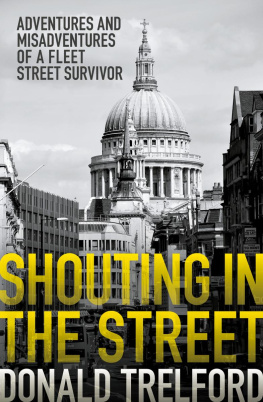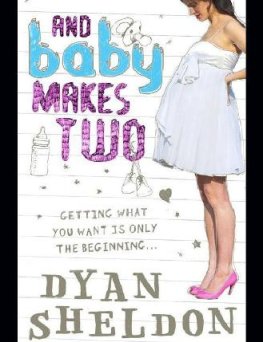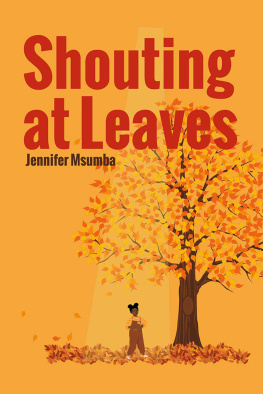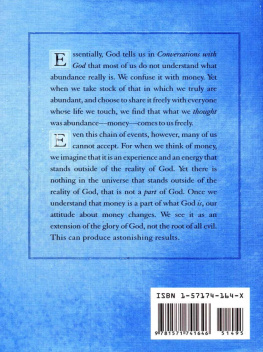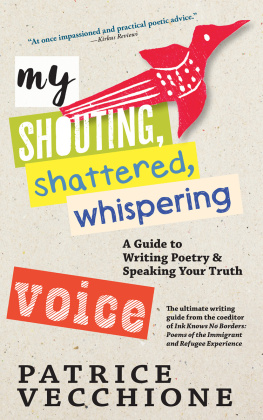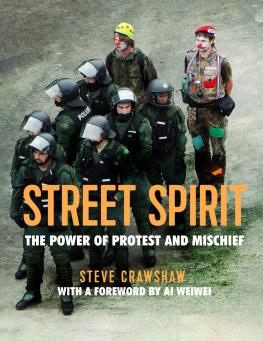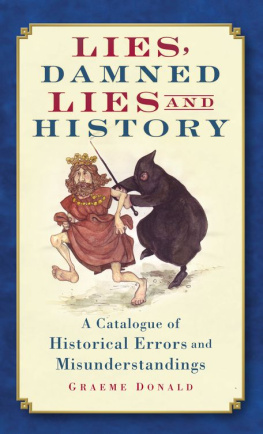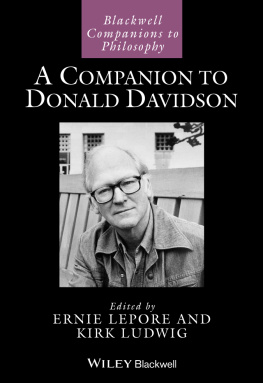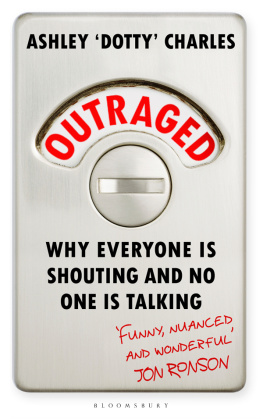Donald Trelford - Shouting in the Street
Here you can read online Donald Trelford - Shouting in the Street full text of the book (entire story) in english for free. Download pdf and epub, get meaning, cover and reviews about this ebook. year: 2017, publisher: Biteback Publishing, genre: Non-fiction. Description of the work, (preface) as well as reviews are available. Best literature library LitArk.com created for fans of good reading and offers a wide selection of genres:
Romance novel
Science fiction
Adventure
Detective
Science
History
Home and family
Prose
Art
Politics
Computer
Non-fiction
Religion
Business
Children
Humor
Choose a favorite category and find really read worthwhile books. Enjoy immersion in the world of imagination, feel the emotions of the characters or learn something new for yourself, make an fascinating discovery.
- Book:Shouting in the Street
- Author:
- Publisher:Biteback Publishing
- Genre:
- Year:2017
- Rating:3 / 5
- Favourites:Add to favourites
- Your mark:
- 60
- 1
- 2
- 3
- 4
- 5
Shouting in the Street: summary, description and annotation
We offer to read an annotation, description, summary or preface (depends on what the author of the book "Shouting in the Street" wrote himself). If you haven't found the necessary information about the book — write in the comments, we will try to find it.
Shouting in the Street — read online for free the complete book (whole text) full work
Below is the text of the book, divided by pages. System saving the place of the last page read, allows you to conveniently read the book "Shouting in the Street" online for free, without having to search again every time where you left off. Put a bookmark, and you can go to the page where you finished reading at any time.
Font size:
Interval:
Bookmark:
For Claire
He was fated, for many years, to be a defender as well as a crusader; a bruising role where he sometimes felt himself beset on all sides. But Trelford was first and foremost a journalist and an editor: multi-talented, hands-on, a master of sport as well as news, shrewd and decisive. The paper, through his years, may often have been under attack, but it also won many awards and gathered together brilliant teams of writers who kept the flame of Astor alive. And Trelford, at the end, was there to pass The Observer on, unbroken and unbowed.
PETER PRESTON, EDITOR OF THE GUARDIAN 197595
Donald is a journalists editor. He appreciates good reporting and instantly recognises it when he sees it. And he has another great advantage over rival editors: he can write as well as his staff. He is an expert reporter with a sensitive ear for words and a nose for news that would do credit to a beagle. These gifts are priceless.
He also managed to lay out the front page and write many of the best headlines himself something beyond most editors these days while simultaneously taking bets from the staff on every big race or rugby international. The queue of people outside his office door after first edition, waiting to hand over fivers, was like Russian serfs paying tribute.
GAVIN YOUNG, FOREIGN CORRESPONDENT FOR THE OBSERVER FROM 1960
Donald Trelford is regarded by friend and foe as the Harry Houdini of journalism. Bound, gagged and tied to the rails and within seconds of the locomotive wheels, Trelford wriggles free from each succeeding crisis. There has scarcely been a dull month in all his years as editor.
PETER MCKAY, DAILY MAIL COLUMNIST, WRITING IN TATLER
Trelford the Rocky Marciano of newspaper politics.
ALAN WATKINS, POLITICAL COMMENTATOR FOR THE OBSERVER 197693
Donald Trelford has a remarkable capacity for staying upright in a shipwreck.
LORD GOODMAN
Donald feels that being editor of The Observer is an invitation to the cocktail party of life.
TATLER
I decided to write this book on 29 April 2013, the day I was told I had prostate cancer. Being given such life-changing news naturally provokes dramatic, even melodramatic, thoughts. It was time, I thought, to get it all down before it was too late. I had been badgered for years by family, friends and former colleagues to turn my party-piece jumble of anecdotes into a coherent tale; one friend said I had reached my anecdotage. Somehow, though, I never got round to it. I used to joke that I was enjoying life too much, living with my new family in the Majorcan sunshine, and didnt really fancy revisiting times when things were more troubled.
Many years ago, I received a substantial advance from a publisher for a book about my time as an editor, but I later paid it all back something practically unheard of, I was told. I informed the publisher that I simply couldnt be bothered to write the book and couldnt imagine that anybody would be bothered to read it anyway. The second part may still be true, but I dont care so much about that now.
I was also prompted to put pen to paper (or finger to keyboard) by the birth of a son, Ben, when I was seventy-three an age at which I had always expected to be dead, not changing nappies in the middle of the night. I realised with a chill, as I stared lovingly into his cot, that I would never know Ben as an adult. Then, three years later, Poppy turned up.
When she was two, Poppy made an unwelcome contribution to this book. Just as I had completed a chapter of about 20,000 words, mostly about Tiny Rowland, she came into my study to say goodnight. As she sat on my lap, she reached towards the keyboard and tapped a few strokes which, remarkably, disappeared the whole chapter. Even computer experts failed to recover it, so I had to rewrite the chapter from memory. I sensed Tinys ghostly hand from beyond the grave.
I thought that, one day, Ben and Poppy might be curious to know what their old dad had been up to in all those years before they were born. The same is probably true of my four older children Sally, Tim, Paul and Laura who didnt see much of me at home when I was working all hours as a journalist and of my wife Claire, come to that, who only met me four years after I had stopped editing The Observer.
Even then, after making the decision to write the book, it took almost another three years to get down to it (during which time, thankfully, the cancer has gone away; so far anyway). I had always imagined that I would write in disciplined periods of intense work, like Jeffrey Archer, whom I see when he comes to Majorca to write his books. But Jeffrey doesnt have to do the school run, or take and collect children from judo or riding lessons, and I imagine he has someone to do his shopping and have the car checked out at the garage. Having two little ones makes it impossible to arrange a regular writing schedule I have just had to snatch the odd hour here and there when I could, or even the odd few minutes to rewrite a passage or add a story I had just remembered.
This book is not an autobiography. It wasnt even meant to be about me, or at least not mainly so. But, after completing most of the book, I began to feel, rightly or wrongly, that readers might want to know who I was and what I had been doing in the twenty-eight years before I joined The Observer. So I introduced two chapters at the start about my family and some friends whod had a strong influence on me at school and university. Really, however, this book is a portrait in action of some interesting people I got to know well, mainly through my three decades on The Observer or through my other, mostly sporting interests. Nearly all of them are more significant people than me. And I suppose something of my own personality may come through in the way I tell their stories and report on my dealings with them.
I started off thinking I would write about these major figures in my life in the style of a series of Observer profiles, but I found that I kept wandering off the central theme as one story reminded me of another. If the chronology seems rather jumbled at times, Im sorry, but the memories of an old man can be a bit like that.
Readers of the chapter on Tiny Rowland, for example, may be surprised when Saul Bellow and the Queen turn up, or that the comic figure of Kenneth Williams intrudes into a chapter on David Astor. The chapter on Pamella Bordes was a late addition because I concluded that, if I were to omit that brief but heavily publicised episode in my life, some readers might wonder if I had something to hide.
I should admit that I was also impelled to write by some published accounts of my time at The Observer, especially about my relations with Lonrho and the papers handling of the Harrods affair. Some of these accounts were not only inaccurate but malicious, sometimes quite ridiculous. I have not responded before to even the most outrageous of them. I thought it was time now to put the record straight.
The title of the book came to me after an incident in London on one of my occasional visits. I usually stay at the Garrick Club, and when I leave I pull my hand luggage through the streets of Covent Garden towards Embankment station on the way to Victoria, the Gatwick Express and the return flight to Majorca, where we have had a finca on the side of a mountain since 2003.
This route takes me past Zimbabwe House on the Strand, which is looking almost as run-down these days as the country it represents. I have some history, as they say, with President Mugabe, as will become clear within this book. Every time I passed the building I would utter a profane imprecation against the old monster.
On one such occasion, however, I had failed to notice that a policeman was right behind me (Charing Cross police station is just across the road). After hearing my cry, the policeman stopped me and asked me what I was doing. I explained to this young black man about Zimbabwe and Mugabe without getting any feeling that he knew or cared what I was talking about. Finally, he said in a patient though slightly exasperated tone: Thats all very well, sir, but we cant have elderly gentlemen shouting in the street, now can we?
Font size:
Interval:
Bookmark:
Similar books «Shouting in the Street»
Look at similar books to Shouting in the Street. We have selected literature similar in name and meaning in the hope of providing readers with more options to find new, interesting, not yet read works.
Discussion, reviews of the book Shouting in the Street and just readers' own opinions. Leave your comments, write what you think about the work, its meaning or the main characters. Specify what exactly you liked and what you didn't like, and why you think so.

